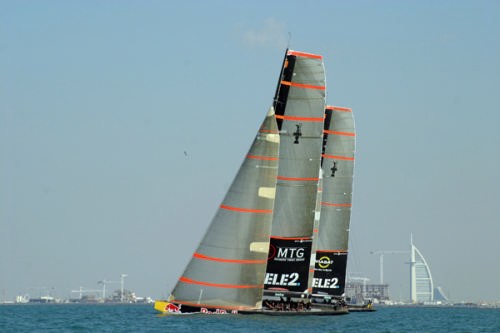The well-educated America’s Cup team
by Bert Willborg on 17 Jan 2007

Photo: David Renkwitz/Victory Challenge Victory Challenge
More than half of Victory Challenge’s sailing team have a qualification from tertiary education. They have engineering degrees, a B.Sc. in Nautical Science or are qualified Naval Architects, degrees in Business Administration or Sports Science, Bachelor’s or Doctorates.
'The facts are clear. Fifty-four percent of the crew have higher education degrees. Sailing at this level is complex and requires a versatile mind,' says Magnus Holmberg, skipper and helmsman, and holder of a Master’s in Engineering.
There are 39 people on the sailing team. Out of these, 21 have completed some form of tertiary education. This is the equivalent of 54 percent. The level of education is highest among the British sailors – 100 percent of the five on the team have a university or college degree. Among the Swedes the equivalent figure is 67 percent.
'Sailing experience and merits can never be compensated for by theoretic education, but it means that you find it easier to understand complicated associations and that you can therefore develop more rapidly as a sailor.'
Oscar Angervall, Oskar Ljung, Sebastian Tenghage and Henrik Walderyd took sabbaticals from their engineering courses when they sailed with Victory Challenge during the America’s Cup in Auckland, 2002-2003. When they returned to Göteborg all of them did as they had said: Oscar Angervall completed his B.Sc. in Mechanical Engineering, Oskar Ljung, Sebastian Tenghage and Henrik Walderyd completed their Master’s degrees in Engineering. (Briton David Carr, was a member of GBR Challenge in Auckland, also did the same thing and finished his B.Sc. in Sports Science).
The level of education is especially noticeably among the afterguard, the onboard decision-makers. Aside from Magnus Holmberg, M.Sc., there is:
* The sailing team’s two qualified naval architects, Briton Neal McDonald, traveller/strategist, and Argentinean Santiago Lange, traveller.
* The team’s only Ph.D., in Computer Science, is the Spanish navigator Alicia Ageno, who also has an important role on land as regards data analysis.
* The other two navigators, Swede Johan Barne, and Briton Simon Fisher, have an M.Sc. and B.Sc. respectively. Johan Barne has a double degree; he also has a B.Sc. in Economic Calculation.
* Mattias Rahm, second helmsman and strategist, has a B.Sc. in Engineering.
'The sailors are also very involved in the technical development of the boats, masts and sails. The sailing team are the purchasers in their relationship with the designers and technicians. Then there’s no disadvantage in having a technical education,' says Magnus Holmberg.
Several of the team’s grinders, the physically most demanding job on the boat, are well qualified. (Many people believe that the position of grinder is simply about being big and strong and that all you need to do is to be able to turn the handles fast and for a long time. But the truth is that a grinder also has to be smart and a quick learner. A grinder must understand what trimmers and the helmsman want to achieve in each situation. He should, in a given situation and in tenths of a second, know when he should change gear and move his power from one winch to another. There are a great number of situations that can arise on the course and which all mean a number of gear changes and moves between different winches.) Besides Sebastian Tenghage, two of the British sailors have B.Sc.s related to physiology, Ian Weighell as well as David Carr. American Matt Smith, grinder/pitman, has a B.A. in Psychology. American Mark Strube has a B.Sc. and an MBA in Business management and worked as a broker when he completed his education. He also sailed a lot and was finally forced to choose. He chose to be a professional sailor.
'I prefer to wear shorts and a t-shirt to work, not a suit,' he says.
Naturally, the two boat captains are well educated:
* Swede Anders Dahlsjö, captain of SWE 73, and mastman, has a B.Sc. in mechanical Engineering.
* Australian Richard Mason, captain of SWE 63, and backstay, has a B.Sc. in Substantial Management.
Yet another two that handle the backstay (besides Richard Mason) also have degrees, as well as Oscar Angervall this also applies to the Briton Richard Sydenham, who has a B.Eng.
Among the sail trimmers there are three with degrees, besides Oskar Ljung and Henrik Walderyd; Frenchman Thierry Fouchier who has an M.Sc. in Business Management.
The Spanish bowman, Pepe Ribes, has a B.Sc. in Nautcal Science and has the authority to steer boats in the merchant navy.
The Australian midbowman Ben Morrison-Jack has a B.A. in Business Administration.
If you want to link to this article then please use this URL: www.sail-world.com/30311